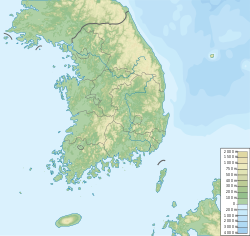Jindong Formation
Appearance
| Jindong Formation | |
|---|---|
| Stratigraphic range: Cenomanian ~ | |
 | |
| Type | Geological formation |
| Unit of | Hayang Group |
| Underlies | Yucheon Group (volcanics) |
| Overlies | Haman Formation |
| Lithology | |
| Primary | Mudstone, siltstone |
| Other | Sandstone, shale |
| Location | |
| Coordinates | 35°24′N 128°24′E / 35.4°N 128.4°E |
| Approximate paleocoordinates | 44°42′N 122°54′E / 44.7°N 122.9°E |
| Region | Gyeongsangnam-do |
| Country | |
| Extent | Gyeongsang Basin |
The Jindong Formation (Korean: 진동층; Hanja: 鎭東層; RR: Jindong-cheung) is a geological formation located in South Korea. It dates to the Cenomanian stage of the Late Cretaceous, with a maximum depositional age of 99.9 ± 0.7 Ma.[1]
Lithology
[edit]The formation is a thick layering of fine-grained, altered volcaniclastic sediments. Most of these sediments are ash-rich mudstone, siltstone, and very fine sandstone. There is also coarser sandstone, conglomerate, carbonates, and ash tuff. [2]
Paleontology
[edit]The area has many dinosaur and bird tracks, including the dinosaur skin impressions and the poorly preserved juvenile sauropod trackway with no ichnotaxon assignment.[3]
| Ichnofossils of the Jindong Formation[4][5][6] | ||||||
|---|---|---|---|---|---|---|
| Ichnogenus | Ichnospecies | Region | Member | Material | Notes | Image |
| Brontopodus | B. isp. | Sauropod tracks | ||||
| Caririchnium | C. isp. | Ornithopod tracks | ||||
| Goseongornipes | G. markjonesi | Bird tracks | ||||
| Gyeongsangornipes | G. lockleyi | Bird tracks | ||||
| Hadrosauropodus | H. kyoungsookimi[7] | The first trackway of a quadrupedal ornithopod discovered in Korea, originally attributed to the ichnogenus Caririchnium.[8] | ||||
| Jindongornipes | J. kimi | Bird tracks | ||||
| Koreanaornis | K. hamanensis | Bird tracks | ||||
| Ornithopodichnus | O. masanensis | Potentially dubious ichnotaxon made by ornithopods, probably representing Caririchnium isp. | ||||
| Pteraichnus | P. isp. | Pterosaur tracks | ||||
| Undichna |
|
Fish tracks | ||||
See also
[edit]References
[edit]- ^ Lee, Tae-Ho; Park, Kye-Hun; Yi, Keewook (October 2018). "Nature and evolution of the Cretaceous basins in the eastern margin of Eurasia: A case study of the Gyeongsang Basin, SE Korea". Journal of Asian Earth Sciences. 166: 19–31. Bibcode:2018JAESc.166...19L. doi:10.1016/j.jseaes.2018.07.004. S2CID 135061525.
- ^ Houck, Karen J.; Lockley, Martin G. (February 2006), "Life in an active volcanic arc: Petrology and sedimentology of dinosaur track beds in the Jindong Formation (Cretaceous), Gyeongsang Basin, South Korea" (PDF), Cretaceous Research, 27 (1): 102–122, Bibcode:2006CrRes..27..102H, doi:10.1016/j.cretres.2005.10.004
- ^ Yoon, H. S.; Lee, Y.-N.; Park, E.; Lee, S. (2024). "A small sauropod trackway from the Upper Cretaceous Jindong Formation (Cenomanian), Goseong County, South Korea". Cretaceous Research. 166. 106022. doi:10.1016/j.cretres.2024.106022.
- ^ Xing, Lida; Díaz-Martínez, Ignacio; Lallensack, Jens N.; Kim, Kyung Soo; Buckley, Lisa G.; Romilio, Anthony; Piñuela, Laura; Wang, Donghao; Chen, Qiyan; Yang, Qing; Chou, Chunyong; Yin, Hang; Jin, Yufei (2025). "Cretaceous vertebrate tracks". Vertebrate Ichnology: 479–747. doi:10.1016/B978-0-443-13837-9.00002-0.
- ^ Lockley, Martin G.; Houck, Karen J.; Yang, Seong-Young; Matsukawa, Masaki; Lim, Seong-Kyu (February 2006), "Dinosaur-dominated footprint assemblages from the Cretaceous Jindong Formation, Hallyo Haesang National Park area, Goseong County, South Korea: Evidence and implications" (PDF), Cretaceous Research, 27 (1): 70–101, Bibcode:2006CrRes..27...70L, doi:10.1016/j.cretres.2005.10.010
- ^ Kim, K.S.; Lockley, M.G.; Romilio, A.; Bae, S.M.; Lim, J.D. (2022). "Fish swim traces from the Jindong Formation (Cretaceous) Korea: Implications for lake basin ichnofacies and paleoecology". Cretaceous Research. 131. 105070. doi:10.1016/j.cretres.2021.105070.
- ^ Yoon, Han Sang; Lee, Yuong-Nam; Jung, Seung-Ho; Kong, Dal-Yong; Kim, Su-Hwan; Son, Minyoung (2021). "A juvenile ornithopod-dominated tracksite from the Lower Cretaceous Haman Formation, South Korea". Cretaceous Research. 125: 104877. doi:10.1016/j.cretres.2021.104877.
- ^ Lim, Jong-Deock; Lockley, Martin G.; Kong, Dal-Yong (March 19, 2012), "The Trackway of a Quadrupedal Ornithopod from the Jindong Formation (Cretaceous) of Korea", Ichnos, 19 (1–2), Taylor & Francis Group: 101–104, Bibcode:2012Ichno..19..101L, doi:10.1080/10420940.2012.664059, S2CID 129058417

